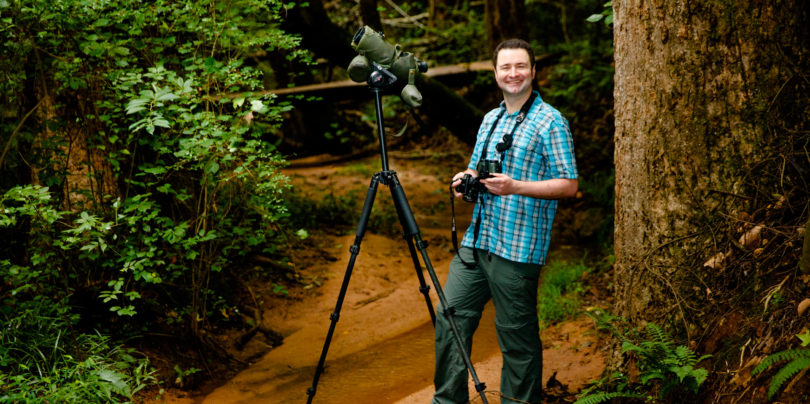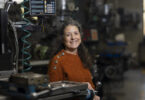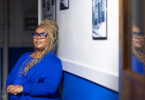Richard Hall, an associate research scientist with a joint appointment in the Odum School of Ecology and the department of infectious diseases in College of Veterinary Medicine, links core scientific concepts to real-world challenges in his classes.
Where did you earn degrees and what are your current responsibilities at UGA?
I earned my bachelor’s and master’s degrees in applied mathematics at Oxford University in England and my Ph.D. in ecological modeling from the department of plant sciences at Cambridge University. I have a joint appointment as an associate research scientist in the Odum School of Ecology and the department of infectious diseases in the College of Veterinary Medicine. In addition to research, teaching and mentoring, I have helped develop two exciting new programs that started at UGA this year—the Bachelor of Arts in ecology, and the Interdisciplinary Disease Ecology Across Scales (IDEAS) Ph.D. program.
When did you come to UGA and what brought you here?
I came to UGA in January 2009. I was attracted by the long history of top-notch ecological research at UGA and collaborative opportunities resulting from cross-campus strengths in conservation biology and infectious disease research.
What are your favorite courses and why?
I enjoy teaching ECOL 3530 (Conservation Biology) because it’s thematically broad and very topical—we learn how integrating approaches from ecology, genetics, economics and sociology can provide solutions to some of the biggest environmental problems of our time—and because it allows me to interact with a diverse group of students from across campus. I also have been fortunate to teach field courses on the Georgia coast (ECOL 3300, Ecological Problem-Solving) and UGA Costa Rica (ECOL/WILD 4060, Field Ornithology); the small-group camaraderie and excitement of seeing ecological processes occurring in real time in nature really brings learning alive.
What interests you about your field?
Mathematical models provide a common language to describe how the breeding success, survival and movement patterns of wild populations change over time and across landscapes, and allow us to explore how species might respond to novel threats arising from habitat loss, climate change and emerging infectious diseases. I’m currently fascinated by animal migration, and particularly its role in spreading harmful pathogens—or helping animals outrun them.
What are some highlights of your career at UGA?
As an undergraduate I never dreamed that I’d be able to pursue a career that combined my mathematical training with my passion for the natural world; I’m very grateful to UGA for providing the opportunity to do just that. I love the variety of my job; through collaborations with talented students, postdocs and faculty at UGA, I’ve been able to work on organisms as diverse as ibis, chimpanzees, crabs, kudzu, vampire bats and monarch butterflies (and their equally diverse array of parasites). It has been a pleasure to see students I have taught or mentored go on to achieve success in both non-academic and academic careers.
How does your research or scholarship inspire your teaching, and vice versa?
I regularly draw on my own research in class; I think the enthusiasm with which we talk about the topics that fascinate us breathes life into the subject material. I also think it’s exciting for students to hear about the cutting edge of research, as it may inspire them to take on some of the most pressing unanswered questions in our field. Linking core scientific concepts to real-world problems in class has helped me better communicate my research and to place it in a broader context. Teaching has also very directly influenced my research—several students I have taught have subsequently pursued research projects with me.
What do you hope students gain from their classroom experience with you?
I hope to show students that preservation of biodiversity and human well-being go hand-in-hand, and that their own actions can help society move toward a sustainable future. It’s my ongoing mission to convince biology students that math isn’t scary—in fact, simple mathematical models have yielded important insights into the control of invasive species and infectious diseases, and the sustainable management of natural resources.
Describe your ideal student.
Curious, hard-working and open-minded.
Favorite place to be/thing to do on campus is…
I love birding at Lake Herrick; less than a mile from my home and my office, it’s a great green space to take a stroll and clear the mind. Over 200 bird species have been recorded there, more than any other spot in the Athens area!
Beyond the UGA campus, I like to…
… spend time at the Georgia coast. We are extraordinarily lucky to have a relatively unspoiled coastline, and I encourage everyone to get out and discover the beauty of our wild barrier islands. I love to travel internationally, and trips in search of birds have taken me to some breathtaking locations. In Athens, restoring native, wildlife-friendly plants to my Five Points yard has been a labor of love, and I’ve been amazed at the diversity of wildlife that has visited given the urban location. If you build it they will come!
Community/civic involvement includes….
I served for several years as president of Oconee Rivers Audubon Society and still sit on their board. This has been a great opportunity to engage the wider public with the amazing natural history in the Athens area and the threats it faces, to make tangible contributions to habitat conservation and bird research through our small grants program, and to partner with the trustees of some great local birding hotspots such as the State Botanical Garden of Georgia, Sandy Creek Park and Nature Center, and the Athens-Clarke County Landfill.
Favorite book/movie (and why)?
I love the wit and wisdom in the writings of Jane Austen and David Sedaris. Movies are a great form of escapism, and I’m a big fan of sci-fi, musicals and comedies. With its dazzling visuals and larger-than-life performances, “The Fifth Element” is my favorite guilty pleasure.
Proudest moment at UGA?
It’s hard to pick one! I’m thrilled that many life sciences students I have co-mentored have not only developed mathematical models for their study systems, but have published this research in top-tier scientific journals. I also love it when students connect with the natural world—nothing makes me happier than when the bleary-eyed ornithology student that curses me for making them get up for a 6 a.m. class fledges into a full-on “bird nerd” by the end of the course!
(Originally published Aug. 21, 2016)








